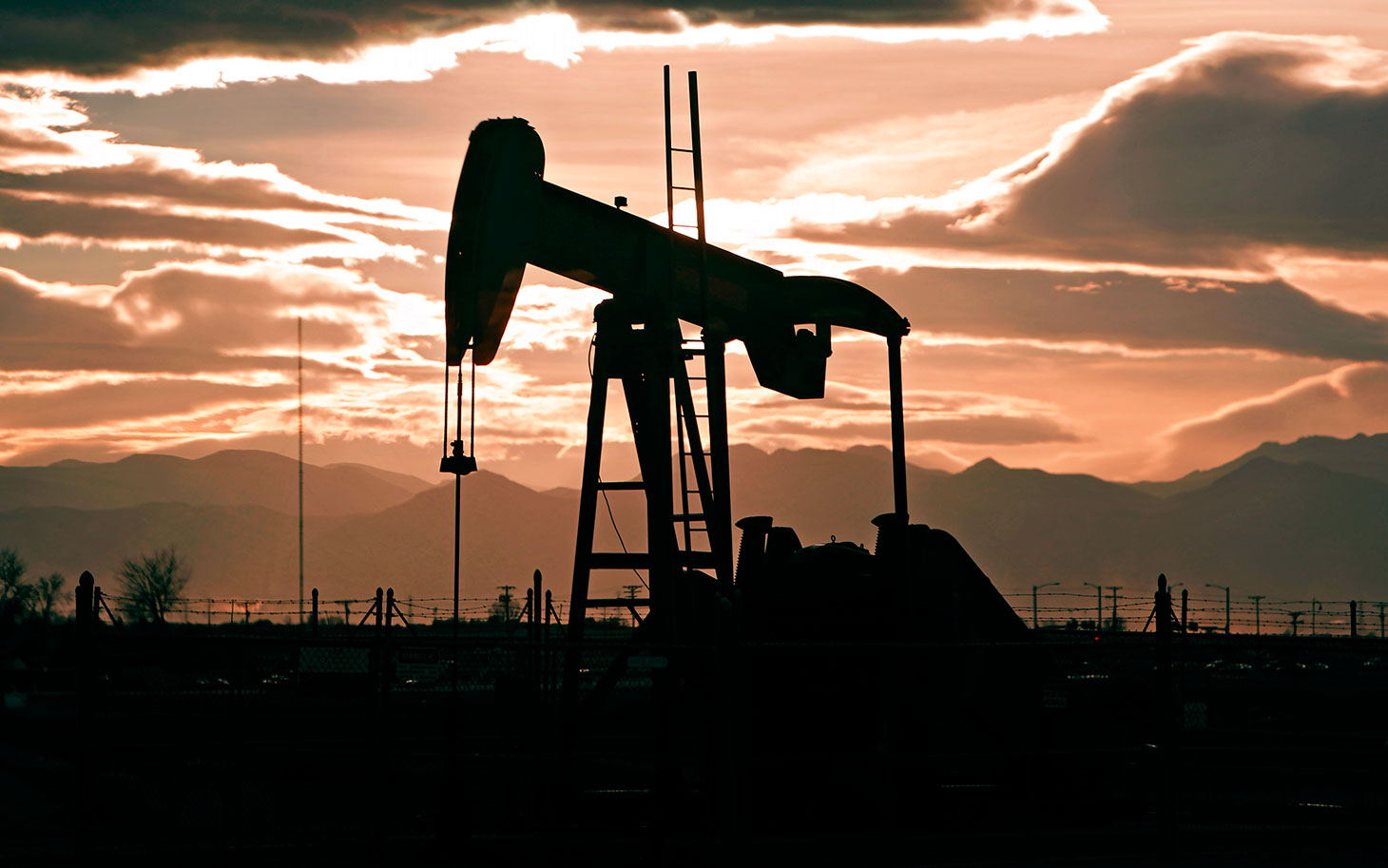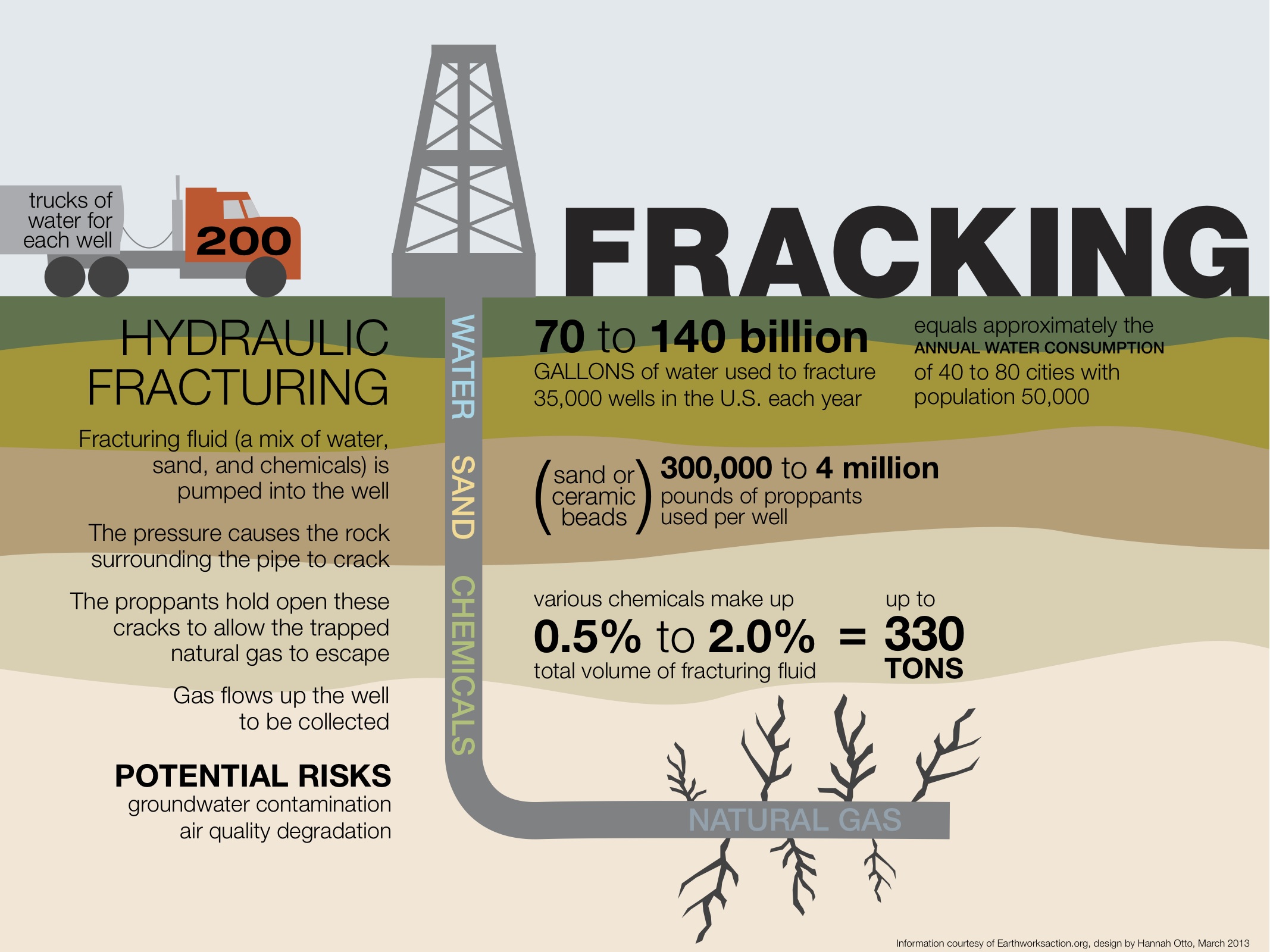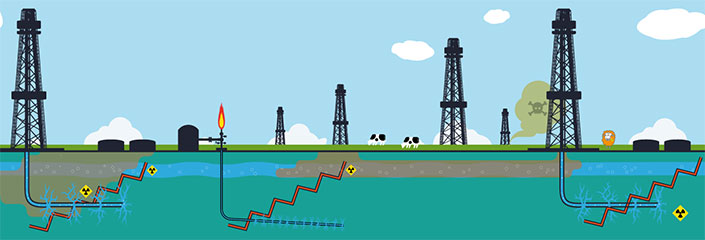Blogs
Anti-Fracking in Nigeria
- What is Fracking?
Fracking is the process of forcing fresh drinkable water, chemicals and sand at high pressure into rock deposits underground. This process causes the rock to break and allows recovery of shale gas and shale oil, otherwise known as "tight oil", that was trapped in the rock. The problem of fracking is that as the pressure breaks through the rock, it can pollute existing underground water pockets. The drilling method requires 15-20 million liters of water for each fracturing, which is equivalent to the daily amount consumed by 40 000 people.
- Case Details
The Algerian government introduced hydraulic fracking in Ayn Saleh, Algeria. The purpose was to extract shale gas from these deserts. Mohad Gasmi led the demonstration against fracking. Soon, all provinces near the fracking site organised protests. 5 months of continuous protests carried on, and in result, fracking operations has been suspended in Ayn Saleh.
The first wells were drilled in 2011 in the Ahnet basin near Tamanrasset, this is such a controversial process due to the enormous amounts of water and toxic chemicals that fracking uses. This is very dangerous because these toxic chemicals could leak into the aquifer reserves and completely destroy the water supply of millions of people in an already water-scarce country.
Recently Algerian hydrocarbon company, Sonatrach got in contact with multinacionales like Shell, ENI and Talisman to tap into the country’s shale gas reserves that will then supply the European market. It is very simple for an institution to just start using the shale gas again due to the government’s Hydrocarbon Law which opens the way for foreign companies to invest in this sector.
Oil and gas are the backbone of the country’s finances which is 62% of the government’s income and 97% of export earnings.
There hasn’t been much done in order to clean up the pollution that was caused due to the oil production in Nigeria, either by the government or Shell Oil. This oil production in Nigeria has contaminated the drinking water of at least 10 communities, even though all this communities were affected there wasn’t much done by the government in Nigeria.
- Shell
Shell is the largest oil company in Nigeria. Shell is now facing a lawsuit in the United Kingdom. There is an argument because it has been said that the company isn’t doing enough in order to maintain and take care of their pipelines from being sabotaged. Shell confirms that there is something being done which is following international best practice in its operations in the West African Country.
Shell has being avoiding the responsibility of the environmental damage to the Nigeria Delta for decades. Shell has a culture of denial which has lead to their means of skill in order to get away with double standards and bad practice.
Recent documents from the court state that the company was aware for years of the significant risk factor which is caused by the corrosive pipes and equipment failure but still, the company didn’t address this information properly. It was admitted by Shell during the legal process, that its figures weren’t correct and that there had been an underestimation of the quantity of oil spilled in Bodo.
- Organizations involved
Mohad Gasmi (the name of the organisation is not specified in the article)
- Who benefits?
European corporations that consume the shale gas that Algeria extracts are the ones to benefit. The extraction is also a safeguard for the Algerian economy because oil and gas are a big portion (about 60%) of all the algerian income and almost all (92%) of export earnings. And since the oil and gas prices dropped 3 years ago the country was at a “state of crisis”.
- Who gets affected?
Harsh chemicals can contaminate these water sources. Water in the desert areas is very scarce and the fact that they use and contaminate the water is outstandingly ignorant to the population living in theses areas that rely on fresh water for living. Also camel owners who must provide a living for their families are affected because they cannot find enough fresh water to give to their camels. People are worried for the aquifers that provide water in the most harsh climate; the desert of Sahara. Farmers form near +the area are protesting because fracking uses so much water that in a near future it might make it harder to do agriculture. Also people are worried that the waters are going to be polluted causing a big problem not only to Algeria, but also to Libya and Tunisia.
- Proposals
It may be more realistic mitigating the consequences of fracking than to fight its use. James Hill, chief executive of the Calgary, Alberta-based energy services firm GasFrac introduced a new fracking method that uses no water at all; instead it uses a gel made from propane which is a hydrocarbon that is already naturally present underground, and it uses a combination of relatively benign chemicals such as magnesium, oxide, and chemicals used in water treatment. This method has been used in Canada and the United States. GasFrac’s water free system has other advantages besides eliminating the need for water. The gel used in the process retains sand better than water, and it’s possible to get the same results.
There are other technological improvements that mitigate some of the environmental downsides of the process. Companies are working on ways to use recycled frac water in fracking, also they are looking for a way to replace harsh chemicals used in the process with more benign mixtures, or to cleanse water that's been used in fracking. The most innovated idea is replacing diesel powered drilling equipment with engines or motors powered by natural gas or solar energy.
One of the most important improvements Algerian in Ayn Saleh want is to be informed of fracking plans that are being taken place.



Post comment
1 Comment(s)
Brilliantly written Marisol, the case in Algeria and other places in Africa are excellent examples of environmental colonialism. Oil spillage has destroyed many communities' sources of livelihood in Nigeria and other parts of Africa and not much is being done in terms of clean up by either the companies responsible for the spill or the government. Gratefully, all these issues are coming to limelight as people get more informed and positive changes are taking place. And at our own level, as we get more informed, we can also get more involved in the fight to preserve the environment and its finite and vulnerable resources. It is our collective responsibility to speak out.
The negative impacts of fracking can not be overestimated. One of its most serious threats is the contamination of underground water formation which is the source of domestic water for many rural communities. Also the amount of water used in fracking operation is massive and since fresh water is finite, great care must be exercised in its usage, Gratefully, there are recent talks around efficient recycling of waste water from fracking process, but it is heavily dependent on cost, recent technological advancement is however bringing down the cost of waste water recycle and generally making the fracking process must environmental sustainable. LPG/propane Gel fracking is a very welcomed development in fracking process but the technology is yet to be widely accepted by the drilling community but it promises greater efficiency and the replacement of millions of gallons of water with a propane gel.
The issue of who benefits is sensitive because resource extraction is suppose to bring job creation, employment and economic development to the resource owners and benefit the extractors as well, but this has not been the case. Resource rich countries have on average done poorly in managing their resources but progress is still possible, if they begin to pursue sustainable growth strategies and reinvesting their resource wealth into productive investments in their countries.
I am really interested in more information on gel fracking... please share as soon as you get more.
Great insights Marisol! very in-depth explanations and great illustrative pictures. You surely have an excellent sense of the issues being explored.
Way to go Marisol, keep, keeping it green....:)

Sandra Ukaigwe
Oct 24, 2017